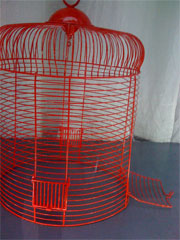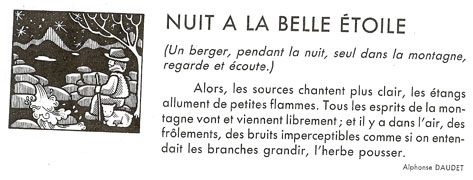The Auto-dictée
She was in a puddle on the floor. “I’ll never learn this!” The text Buddy-roo was trying to memorize had been in her assignment agenda all week, but somehow we hadn’t gotten to it. Her homework was already heavier than usual, it was all we could do to get through the obvious assignments, let alone a special one. With her 7-year-old level of knowledge, maturity and motor skills, writing out sentences and circling the subject and conjugating the verb takes a lot longer than you’d think. Add some math problems and spelling to that, and the night is shot. It’s a bit easier than it used to be, but it’s still a grind. De-facto and I take turns being firm but friendly about getting homework done, one of us taking over when we notice the other’s voice taking on that getting-to-the-end-of-my-rope edge.

An incoming email message coincided with our parental angst. A thoughtful father made an informal survey of some of the parents, wondering, “Is it just us, or has there been an increase in homework?” Within hours, a flurry of responses. I’m usually annoyed by group email conversations using reply-all, but this was different. I opened each message eagerly. Another parent drowning in homework. Another classmate of Buddy-roo’s spending two plus hours a night to get it done, like her. Another mother wonders why, with all this work, there’s also an auto-dictée. Another father wishes the time spent with his children in the evening wasn’t always spent dogging them to finish their assignments. What a relief to discover we’re not the only ones plunged into shock from the amped-up after-school workload. A few of the more experienced parents tempered the complaints, commenting gently that this particular year is a tough one for French school kids and we just have to gut it out. But the main message in this email string was clear: most of us are exasperated.
We’re not a tightly-wound gang bent on steering our children toward the grands écoles. Most of us (I think) are just trying to help our kids keep up. Or more important: not to be stressed out. And the message string wasn’t only a rant. The discussion was a heartening reflection on the parents, ultimately morphing into a back-and-forth of constructive solutions and possible responses. Do we approach the teacher and complain? If so how to do it? Individually? Collectively? What are the consequences? How do we understand her challenges? Will it make any difference? Or do we just persevere and wait for the year to finish?

Then a message from a harried mother, apologizing for hijacking the conversation, but could someone scan and send her a copy of the auto-dictée because her son forgot to bring it home. That was when it dawned on me, the way something can come to you too late, even though it’s been right in front of your eyes like a series of neon billboards. Auto-dictée? It’d been mentioned several times in the back-and-forth of parent emails. What was this auto-dictée?
Minutes later a message from someone’s father who’d typed in the text. “I’m sending it to you from memory,” he wrote. There was a weary tone to his words. “After working on it for hours with my son, I’m afraid I know it by heart.”
I called the mother of one of Buddy-roo’s classmates. Even while I was dialing the phone, I had a bad feeling this had something to do with that folded piece of paper in the agenda we’d been ignoring. She confirmed this, and explained the task: Unlike the usual memorization assignments where you have to recite a poem by heart in front of the class (I find this charming), the auto-dictée means to write out the passage from memory, without being prompted or having it read out loud first, as in a standard dictation. This would be a challenging assignment for Buddy-roo if we had started preparing earlier in the week. To begin to memorize it so she could write it unaided, on the night before it was due, left us little hope for success.

Buddy-roo stomped and cried, insisted that we were wrong, that the teacher said she only had to learn the poem, she didn’t have to write it from memory. Rather than fight her, especially this late on a Thursday night, I said, “Okay, let’s just learn it by heart.” I started to work with her, line by line, but it’d been a long day. I was tired. I was angry. It wasn’t going well.
“Hey Buddy-roo,” said De-facto, “Why don’t you teach it to me?”
She handed him the paper. He read the passage a few times and handed it back. Then he started, “Alors, les source…” and he hesitated. She prompted him. Each time he missed a word, she corrected him. She transformed into the teacher, guiding him through the poem. And when he’d finished, he said to her, “Now see if you can do it better than I did.” And she did. It wasn’t perfect, but she had the basics. We had no idea if she could write it from memory, but it was ten o’clock and you know what? That was good enough.

I did write a note to her teacher in the cahier de correspondance, explaining that we had understood the instructions of the auto-dictée too late, wondering if in the future she might give us more specific guidance on new types of assignments so we could help Buddy-roo to be prepared. In the end I wished I hadn’t. The note she sent back to me wasn’t very empathetic. She started with how I had incorrectly referred to the text of the auto-dictée as a poem. Had it been a poem, she wrote, it would have been in the cahier de poesie. (It was downhill from there.)
But hey, Buddy-roo managed to eke out a minimum grade on her auto-dictée, and even got a few words of praise from the teacher, despite her lack of preparation. She also volunteered, in a sheepishly sweet way, that I’d been right about the assignment. (That’s a first!) As for De-facto, he has no recall of the text he’d learned. But at least now he knows it’s not a poem.


January 31st, 2011 at 4:57 am
I love the generous way De-Facto helped Buddy-Roo to learn the passage. I also love how the parents banded together to help each other.
January 31st, 2011 at 11:52 am
Reading this I recall a few similar nights with Meghan, and have helped Arthur as well, to get some challenging things done.
It’s a rite of passage isn’t it? For both child and parent. Kudos to de-facto for the creative reversal…
January 31st, 2011 at 12:13 pm
I feel very self-conscious commenting to this post, when so many others of yours have moved/hit a chord with me but I have felt unable to adequately respond… but just to say your experience with Buddy-roo is scaring me a little for when my son starts the premiere primaire in August! I’m storing away your creative solutions in the hope that I can deal with any homework horrors at least somewhat gracefully.
February 4th, 2011 at 9:28 am
Ahhh dealing with home works… Can be a nightmare, espacially when you just want to do so many things but homeworks. Can be a torture also for us, parents. It is one of my quest, to find my children’s own way of learning.
I have to confess that I’m quite lucky. My daughters are fast learners. When they come home with a poetry to learn, they already know it. It helps a lot, I only have to deal with “how can you find the right emotion to say this or that ?”
But this year, Marine skipped a year and it is more demanding for her. I’ve had to discover that it can be difficult. Last week-end, I let her do her word meanings research on my computer. I always try to find some different of funny ways to learn.
Like this afternoon in the garden when she was drawing words and writing their spelling next to the drawing. So it took us more time, but it was like l-playing and a nice moment under the sun for me. Sipping my tea. http://www.maman-creative.com/2010/05/ortographe-plaisir.html
Also like this playcard set we made for a multiplications memory… http://www.maman-creative.com/2010/11/memory-des-multiplications.html
And what works with Marine doesn’t always work with Lou…
Bruno Hourst in his book Aidez votre enfant à apprendre gives many examples of that. And helps you understand how your child learns and what can help.